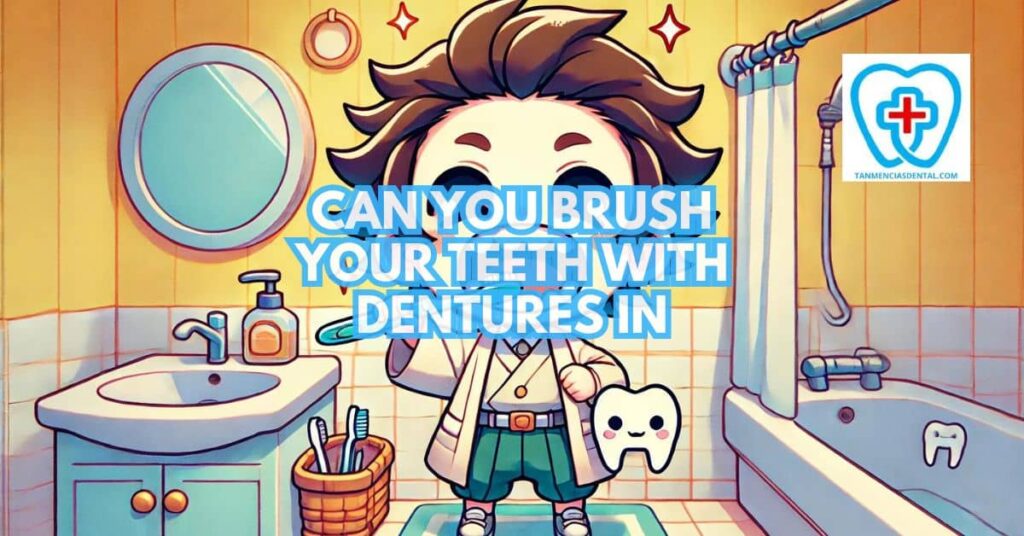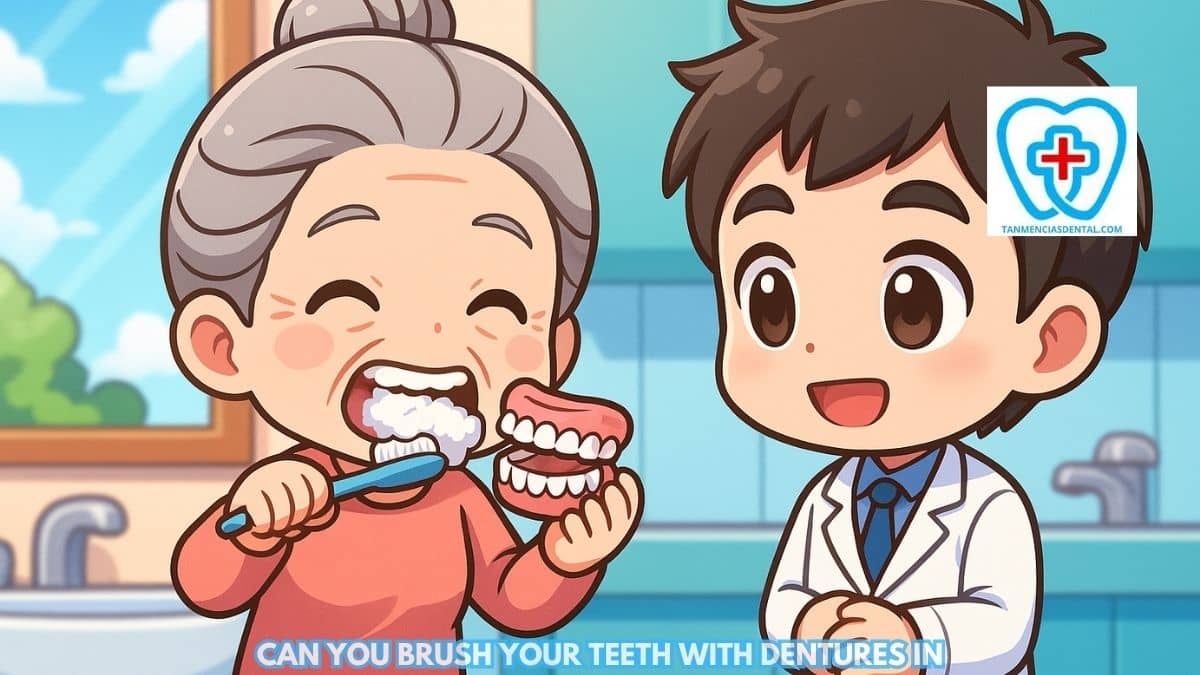Brushing your teeth with dentures may seem like a quick solution, but it does not clean your mouth as well as removing them.
Dentures can block your toothbrush from reaching natural teeth, gums, and the roof of the mouth.
This can leave behind food particles, bacteria, and plaque that increase the risk of dental problems.
Learning the right way to clean dentures and natural teeth helps protect your oral health and keep your smile comfortable.
We’ll explain the answer to “can you brush your teeth with dentures in” and give simple steps for proper denture and mouth care.
1. The Challenges of In-Mouth Denture Brushing
Brushing with dentures in your mouth can be tricky.
Dentures can move around, making it hard to reach all areas of your gums and natural teeth.
This can leave food particles and plaque behind, increasing the risk of gum disease.
Additionally, the surface of dentures is different from that of natural teeth and requires special care.
Without proper techniques, you might not be cleaning as effectively as you think.
🦷 How Long to Wait After Brushing Teeth to Use White Strips?
2. Full and Partial Dentures and How Brushing Differs
Brushing with partial dentures still in place can scratch or loosen the small metal parts that hold them.
It can also leave plaque around the teeth that support the denture since the clasps block the brush.
Food and bacteria may get trapped under the base of partial dentures if they are not removed for cleaning.
With full dentures, brushing them while in your mouth mostly ignores the gums and roof of the mouth, which also need to be cleaned.
Implant-supported dentures must also be taken out so the abutments can be brushed gently to keep them healthy.
🦷 How to Choose the Best Toothpaste to Whiten Teeth with Braces
3. Why Denture Hygiene Matters
Keeping your dentures clean is crucial for your overall oral health.
Dentures can harbor bacteria if not cleaned properly, leading to infections and bad breath.
Poor hygiene can also cause staining and reduce the lifespan of your dentures.
Regular cleaning helps prevent these issues and ensures your dentures look and feel their best.
Taking care of your dentures also means taking care of your mouth.
🦷 Is It Normal for Your Teeth to Wiggle with Braces?
4. A Step-by-Step Guide to Cleaning Your Dentures
First, remove your dentures before cleaning them.
Use a soft-bristled brush and a denture cleaner to scrub all surfaces gently.
Avoid using regular toothpaste, as it can be too abrasive.
Rinse your dentures thoroughly to remove all cleaning solutions.
Soak them overnight in a denture-cleaning solution to ensure they stay fresh and bacteria-free.
🦷 Hate Brushing Teeth? The Daily Struggle is Real

5. Is Toothpaste Safe for Dentures?
Using regular toothpaste on dentures is not recommended.
Toothpaste designed for natural teeth can be abrasive and might scratch the surface of dentures.
These scratches can create small grooves where bacteria can hide, leading to bad breath and infections.
Instead, use a cleanser specifically made for dentures to avoid damaging them.
This ensures your dentures remain in good condition and free from harmful bacteria.
🦷 Why Poor Brushing With Braces Can Lead to Serious Dental Problems
6. Don’t Forget Your Natural Teeth!
Even with dentures, it’s crucial to maintain your natural teeth and gums.
Removing your dentures allows you to brush your natural teeth properly, reaching all areas.
Use a soft-bristled toothbrush and fluoride toothpaste to clean your teeth and gums.
This helps prevent tooth decay and gum disease, which can affect the fit and comfort of your dentures.
Maintaining good oral hygiene is essential for overall dental health.
🦷 Is Coconut Oil Good to Brush Your Teeth With?
7. Preventing Common Denture Problems
Proper care can prevent many common denture issues, like staining and odor.
Avoid using hot water to clean your dentures, as it can cause warping.
Regularly inspect your dentures for cracks or wear, and address any issues immediately.
Also, be cautious with hard or sticky foods that can damage your dentures.
Following these tips helps keep your dentures in good condition and prolongs their lifespan.
🦷 Why Orthodontic Toothbrushes Are Essential During Orthodontic Treatment
8. Effective Denture Cleaning Solutions
Special denture cleansers are designed to clean dentures without causing damage.
These solutions can remove tough stains and bacteria more effectively than regular toothpaste.
Soaking your dentures in these solutions daily helps maintain their cleanliness and hygiene.
Always follow the manufacturer’s instructions for the best results.
Using the right products ensures your dentures stay clean and free from harmful microorganisms.
🦷 Best Foods for Gingivitis: Fight Gum Disease Naturally
9. The Importance of Professional Denture Care
Regular visits to your dentist are crucial for maintaining the health of your dentures.
Professional cleanings can reach areas that daily cleaning might miss, removing built-up plaque and tartar.
Your dentist can also check the fit and condition of your dentures, ensuring they remain comfortable and functional.
Regular checkups can identify potential issues early, preventing more serious problems.
Professional care complements your daily cleaning routine and ensures your dentures last longer.
🦷 Do You Rinse Your Mouth After Brushing Your Teeth?
10. Consult Your Dentist for Personalized Advice
Each person’s oral health needs are different, and your dentist can provide guidance that fits your situation.
They may suggest specific cleaning products or techniques that protect both your dentures and any remaining teeth.
If you have a dental implant, your dentist can show you the correct way to clean around the implant parts so they stay healthy and stable.
Your dentist can also check for gum problems, sore spots, or early signs of infection that you might not notice on your own.
When issues like poor fit or discomfort appear, a professional adjustment is safer than trying to fix dentures yourself.
Personalized advice from your dentist helps you care for your dentures and natural teeth in the best possible way.
🦷 Dental Diagnostics In Marikina
11. Practical Tips for Daily Denture Care
Incorporating a few simple habits into your daily routine can make a big difference in denture hygiene.
Always rinse your dentures after meals to remove food debris that can cause odor and bacterial growth.
Brush your dentures carefully at least once a day using a soft brush and a denture-safe cleanser to protect the surface from scratches.
Do not use regular toothpaste, as it can be too harsh and may damage the denture material over time.
Remember that brushing while your dentures are still in your mouth will not clean the gums, tongue, or roof of your mouth properly.
When not wearing them, store dentures in clean water or a denture-soaking solution to prevent them from drying out or losing shape.
Make it a habit to check your dentures daily for any cracks or wear so small problems can be fixed before they worsen.
These steps help ensure that your dentures stay clean, last longer, and keep your mouth feeling fresh and healthy.
🦷 Convenient Dental Clinic in Marikina
👨⚕️ Conclusion
Brushing your teeth with dentures in is not the most effective method for thorough cleaning.
Removing them ensures you can clean both your dentures and natural teeth properly.
Following the correct cleaning protocols helps maintain a healthy and comfortable smile.
Regular dental checkups and personalized advice from your dentist are also vital.
By taking these steps, you can ensure your dentures and natural teeth stay in optimal condition.
😊 Self-Promotion
Visit Tan-Mencias Dental Clinic in Parang, Marikina City, for exceptional dental care tailored to your needs.
Our friendly and experienced team is dedicated to ensuring your comfort and oral health.
Have questions or need to schedule an appointment?
You can reach out to us via our Facebook page, our website’s contact form, or call us directly at 9171451074.
We look forward to helping you achieve a bright and healthy smile!
❔ FAQs
1. Can you sleep with dentures in?
It is better to remove dentures before sleeping.
Taking them out lets your gums and mouth rest and lowers the risk of infection or soreness.
Leaving dentures in overnight can trap bacteria and irritate.
Soaking them while you sleep also helps keep them clean and fresh.
2. How often should I brush my dentures?
Dentures should be brushed at least once a day to remove food and plaque.
Many dentists recommend brushing after each meal if possible.
Daily brushing prevents stains and keeps your mouth healthy.
Be sure to also rinse your dentures whenever you remove them during the day.
3. What is the best way to clean my gums if I wear dentures?
After removing your dentures, gently brush your gums, tongue, and the roof of your mouth with a soft toothbrush.
This removes bacteria and stimulates blood flow in the tissues.
If your gums are sensitive, you can use a damp washcloth instead.
Cleaning your gums daily helps prevent irritation and infections.
4. Can I use mouthwash with dentures?
Yes, you can use mouthwash, but remove your dentures first for best results.
Rinsing with mouthwash helps clean your natural teeth, gums, and soft tissues.
Some mouthwashes also reduce bacteria and freshen breath.
Always check that the mouthwash does not contain alcohol if it causes dryness.
5. How long do dentures usually last?
Most dentures last between five and ten years with proper care.
Over time, the shape of your mouth may change, and dentures may need adjustments or replacement.
Regular dental visits help check the fit and condition of your dentures.
Taking care of them every day helps them last longer.

